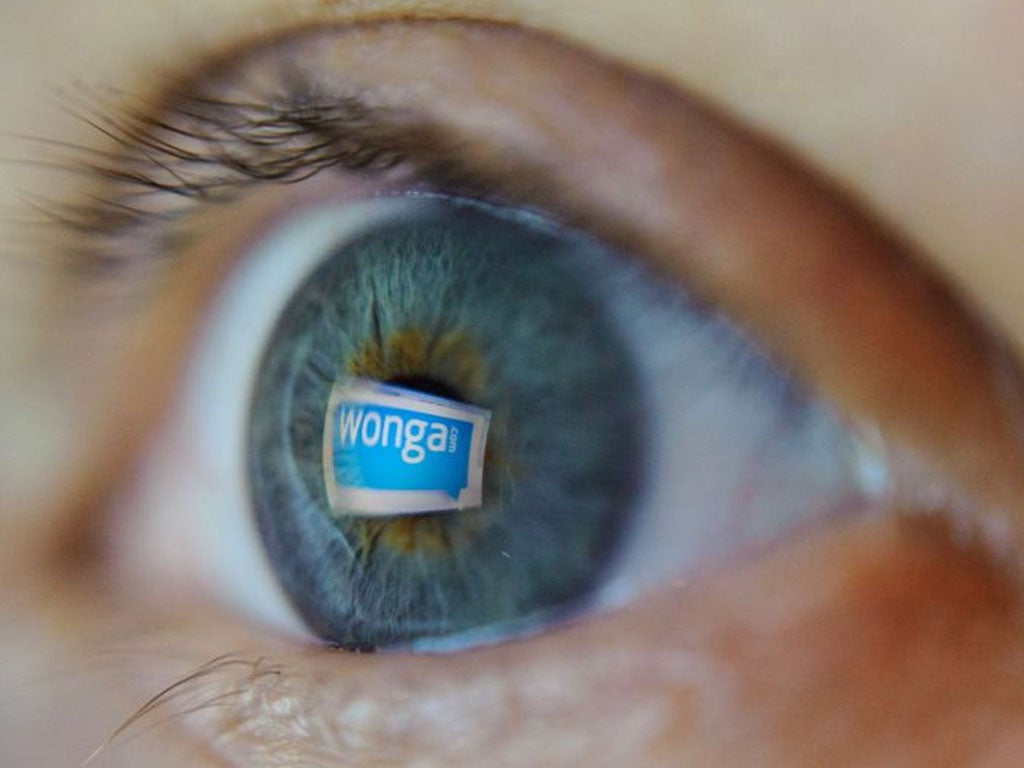Payday lender Wonga rakes in over £1m in profits a week
Controversial company says profits after tax rose 36 per cent to £62.5 million

Controversial payday lender Wonga earned profits of more than a million pounds a week last year as surging numbers of cash-strapped Britons turned to its high-interest loans.
The company, which charges households annual interest rates of more than 5,800%, said profits after tax rose by 36% to £62.5 million in 2012.
Lending was up 68% in the year to £1.2 billion, while customer numbers ballooned 61% to more than a million amid the ongoing squeeze on household finances and banks' retreat from riskier lending.
The online lender was engulfed in a storm of controversy recently when the Archbishop of Canterbury said he wanted the Church of England to "compete" it out of existence by backing credit unions.
Wonga typically lends sums of about £200 to £400 to consumers, repaid over a few weeks. It has also started offering loans of up to £30,000 to credit-starved small businesses, repayable over a year.
The company, which is owned by private equity and management, came under fire for boosting profits at the expense of struggling consumers.
Gillian Guy, chief executive of charity Citizens Advice, said: "Payday lenders' profits come directly from the pockets of consumers, many of whom turn to them out of desperation rather than choice.
"The payday loans industry must focus on boosting customer welfare, rather than boosting profits at the expense of hard-pressed householders who struggle to pay back unaffordable loans."
Trade union Unite branded it "vulture capitalism", saying the sector "preys on the financially vulnerable".
But founder and chief executive Errol Damelin insisted the online lender operates in an "upfront and transparent" way, adding it rejects two-thirds of applications.
Wonga said it earns an average profit of £15 per loan, or 5p of profit on every £1 it lends. It did not pay a dividend but reinvested profits back into its development.
He said: "This is not about people on breadlines being desperate and us being a lender of last resort."
He said Wonga's customers tend to be digital-savvy, young, single and employed, rather than those on benefits, and insisted the company's profit margins are "not outrageous in any way to us".
Mr Damelin added: "Our customers are telling us that we provide very good value for money."
Wonga wrote off £126 million in impairments including soured loans during the year, almost double 2011 impairments, but said it is comfortable with its default rate of 7.4%.
The entire payday lending industry, worth £2 billion, was referred in June for a full-blown investigation by the Competition Commission after the trading watchdog uncovered "deep-rooted" problems.
The Office of Fair Trading made the referral because it continues to suspect that features of the market "prevent, restrict or distort competition".
Stella Creasy, the Labour MP who has criticised Wonga in the past, said: "The fact that Wonga is able to make more than £1 million a week in an industry which has widespread malpractices should be of great concern to all of us in Britain.
"What that says about families who are struggling financially, what it says about the kind of regulation we currently have in the UK and the things we need to do to make sure people in Britain can borrow affordably, Wonga might be celebrating today, I'm very, very concerned about what this might mean for people in my community and across the country who are paying the price for their profits."
The company claims the annual percentage rate (APR) measure does not represent its true cost to consumers as loans are repaid much sooner, adding it freezes interest when customers are 60 days in arrears.
Mr Damelin said: "It's very unlikely that a £400 loan is what gets somebody into a financial mess. We are doing it with total integrity."
Instead he said the payday lending industry has been tarred by the behaviour of other high-interest lenders. "There's a lot wrong in how other parts of the industry operates," he said.
Wonga said it paid £22 million in corporation tax during the year and now employs more than 500 staff, adding it expects to grow its workforce by 50% this year.
Mr Damelin also cast doubt on the Church of England's plans to rival it, after the Most Reverend Justin Welby said recently that he hoped the Church's support for credit unions would drive Wonga out of business.
It later transpired that the Church had invested indirectly in Wonga, triggering an investigation by the Church.
Mr Damelin said: "Credit unions in the UK have so far not been successful at getting to scale.
"It's difficult to imagine a sub-scale organisation bring able to deliver these services."
Revenues surged 67% to £309.3 million during the year and the company also laid out plans to tackle banks' stranglehold on lending to small businesses, which it said is "broken".
Mr Damelin said: "Job growth needs to come from small businesses. They are critical for the UK economy."
Wonga has also expanded abroad into South Africa, Canada, Poland and Spain.
PA
Subscribe to Independent Premium to bookmark this article
Want to bookmark your favourite articles and stories to read or reference later? Start your Independent Premium subscription today.

Join our commenting forum
Join thought-provoking conversations, follow other Independent readers and see their replies